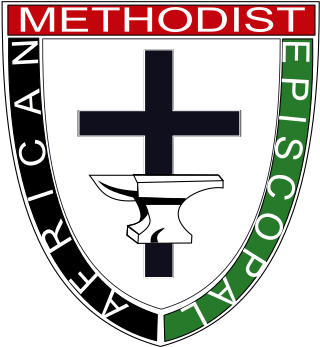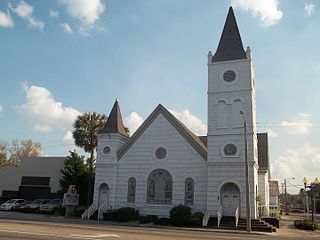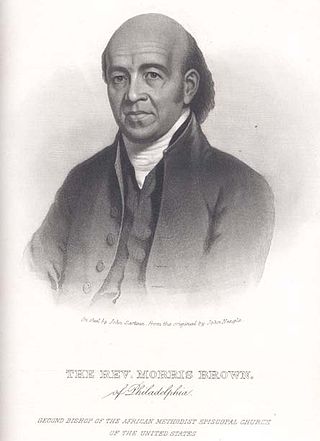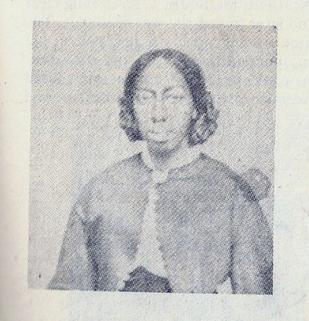Methodism, also called the Methodist movement, is a group of historically related denominations of Protestant Christianity whose origins, doctrine and practice derive from the life and teachings of John Wesley. George Whitefield and John's brother Charles Wesley were also significant early leaders in the movement. They were named Methodists for "the methodical way in which they carried out their Christian faith". Methodism originated as a revival movement within Anglicanism originating out of the Church of England in the 18th century and became a separate denomination after Wesley's death. The movement spread throughout the British Empire, the United States and beyond because of vigorous missionary work, and today has about 80 million adherents worldwide.
The Spencer Churches are two African-American Christian denominations in the United States that resulted from an 1860s schism in the Union Church of Africans. That denomination was founded by Peter Spencer, a freed slave, in Wilmington, Delaware in 1813.
The Methodist Episcopal Church (MEC) was the oldest and largest Methodist denomination in the United States from its founding in 1784 until 1939. It was also the first religious denomination in the US to organize itself nationally. In 1939, the MEC reunited with two breakaway Methodist denominations to form the Methodist Church. In 1968, the Methodist Church merged with the Evangelical United Brethren Church to form the United Methodist Church.
The Methodist Episcopal Church, South was the American Methodist denomination resulting from the 19th-century split over the issue of slavery in the Methodist Episcopal Church (MEC). Disagreement on this issue had been increasing in strength for decades between churches of the Northern and Southern United States; in 1845 it resulted in a schism at the General Conference of the MEC held in Louisville, Kentucky.

The African Methodist Episcopal Church, usually called the AME Church or AME, is a Methodist Black church. It adheres to Wesleyan-Arminian theology and has a connexional polity. The first independent Protestant denomination to be founded by Black people, AME welcomes and has members of all ethnicities.

The Christian Methodist Episcopal (C.M.E.) Church is a historically black denomination that branched from earlier Methodist groups in the United States. It is considered to be a mainline denomination. The CME Church was organized on December 16, 1870, in Jackson, Tennessee, by 41 former enslaved congregants with the full support of their white sponsors in their former Methodist Episcopal Church, South who met to form an organization that would allow them to establish and maintain their own polity. They ordained their own bishops and ministers without their being officially endorsed or appointed by the white-dominated body. They called this fellowship the Colored Methodist Episcopal Church in America, which it remained until their successors adopted the current name in 1954. The Christian Methodist Episcopal today has a church membership of people from all racial backgrounds. It adheres to Wesleyan-Arminian theology.

The African Methodist Episcopal Zion Church, or the AME Zion Church (AMEZ) is a historically African-American Christian denomination based in the United States. It was officially formed in 1821 in New York City, but operated for a number of years before then. The African Methodist Episcopal Zion Church adheres to Wesleyan-Arminian theology.

The black church is the faith and body of Christian denominations and congregations in the United States that predominantly minister to, and are also led by African Americans, as well as these churches' collective traditions and members. The term "black church" may also refer to individual congregations, including in traditionally white-led denominations.

Daniel Alexander Payne was an American bishop, educator, college administrator and author. A major shaper of the African Methodist Episcopal Church (AME), Payne stressed education and preparation of ministers and introduced more order in the church, becoming its sixth bishop and serving for more than four decades (1852–1893) as well as becoming one of the founders of Wilberforce University in Ohio in 1856. In 1863, the AME Church bought the college and chose Payne to lead it; he became the first African-American president of a college in the United States and served in that position until 1877.

Religion of black Americans refers to the religious and spiritual practices of African Americans. Historians generally agree that the religious life of black Americans "forms the foundation of their community life". Before 1775 there was scattered evidence of organized religion among black people in the Thirteen Colonies. The Methodist and Baptist churches became much more active in the 1780s. Their growth was quite rapid for the next 150 years, until their membership included the majority of black Americans.

Daniel Coker (1780–1846), born Isaac Wright, was an African American of mixed race from Baltimore, Maryland. Born a slave, after he gained his freedom, he became a Methodist minister in 1802. He wrote one of the few pamphlets published in the South that protested against slavery and supported abolition. In 1816, he helped found the African Methodist Episcopal Church, the first independent black denomination in the United States, at its first national convention in Philadelphia.

Henry McNeal Turner was an American minister, politician, and the 12th elected and consecrated bishop of the African Methodist Episcopal Church (AME). After the American Civil War, he worked to establish new A.M.E. congregations among African Americans in Georgia. Born free in South Carolina, Turner had learned to read and write and became a Methodist preacher. He joined the AME Church in St. Louis, Missouri, in 1858, where he became a minister. Founded by free blacks in Philadelphia, Pennsylvania, in the early 19th century, the A.M.E. Church was the first independent black denomination in the United States. Later Turner had pastorates in Baltimore, Maryland, and Washington, DC.

Hood Theological Seminary is a Christian seminary sponsored by the African Methodist Episcopal Zion Church in Salisbury, North Carolina. It is a graduate and professional school sponsored by the African Methodist Episcopal Zion Church and approved by the University Senate of The United Methodist Church. From its founding in 1879 until 2001, the seminary was part of Livingstone College; it is now independent. The seminary is accredited by the Association of Theological Schools in the United States and Canada.

The history of Methodism in the United States dates back to the mid-18th century with the ministries of early Methodist preachers such as Laurence Coughlan and Robert Strawbridge. Following the American Revolution most of the Anglican clergy who had been in America came back to England. John Wesley, the founder of Methodism, sent Thomas Coke to America where he and Francis Asbury founded the Methodist Episcopal Church, which was to later establish itself as the largest denomination in America during the 19th century.

Morris Brown was one of the founders of the African Methodist Episcopal Church, and its second presiding bishop. He founded Emanuel AME Church in his native Charleston, South Carolina. It was implicated in the slave uprising planned by Denmark Vesey, also of this church, and after that was suppressed, Brown was imprisoned for nearly a year. He was never convicted of a crime.

Eliza Ann Gardner was an African-American abolitionist, religious leader and women's movement leader from Boston, Massachusetts. She founded the missionary society of the African Methodist Episcopal Zion Church (AMEZ), was a strong advocate for women's equality within the church, and was a founder of the National Association of Colored Women's Clubs.

James Walker Hood was an African Methodist Episcopal Zion Church bishop in North Carolina from 1872 to 1916. Before the Emancipation Proclamation, he was an active abolitionist, and during the American Civil War he went to New Bern, North Carolina where he preached for the church to the black people and soldiers in the area. He was very successful and became an important religious and political leader in North Carolina, becoming "one of the most significant and crucial African American religious and race leaders during the nineteenth and early twentieth centuries". By 1887 he had founded over six hundred churches in Virginia, North Carolina, and South Carolina and erected about five hundred church buildings. He was politically and religiously active as well, supporting education, civil rights, and the ordination of women.

Marie Louise Clay Clinton was an American educator, singer, and church leader. She was the founder and superintendent of the Buds of Promise Juvenile Mission Society, under the Women's Home and Overseas Missionary Society (WH&OMS) of the African Methodist Episcopal Zion Church.

The Mary E. Bell House is a historic house at 66 Railroad Avenue approximately 1/10th mile south of the Long Island rail road in Center Moriches, Long Island, New York. Built in 1872 by Selah Smith of Huntington who purchased the land, it is significant in the area of ethnic history for the Smith and Bell families and the African-American AME Zion community of Center Moriches during the nineteenth and twentieth centuries. It was listed on the National Register of Historic Places in 2020. It is under the Stewardship of the Ketcham Inn Foundation.

The A.M.E. Zion Church of Kingston is an African Methodist Episcopal Zion Church located in Kingston, New York. Founded in 1848, as a land grant from wealthy Black residents, Mrs. Sarah-Ann Hasbrouck and her husband, Alexander, it is the oldest continuous African-American congregation in Kingston and Ulster County. The church is located at 26 Franklin Street in the city's Fourth Ward.
















